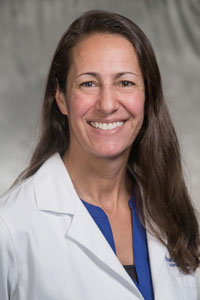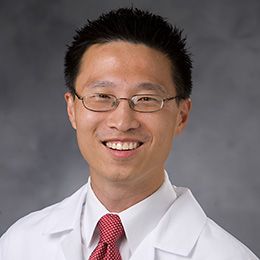
Congratulations to three of our faculty members who are receiving distinguished academic promotions in the division of General Internal Medicine (GIM)!
“It gives me tremendous pleasure to announce these three promotions to Associate and Full Professor. As you know, these academic promotions mark faculty members’ scholarly achievements and are a hallmark of professional accomplishment in our school. Faculty appointed to Associate Professor and Full Professor have achieved recognition within Duke and at peer institutions as leaders in their fields both nationally and/or internationally.”
- William Yancy, MD – Interim Division Chief, Duke General Internal Medicine
To Full Professor

Daniella Zipkin, MD
DGIM recruited Dr. Daniella Zipkin in 2007 and she joined faculty as an Assistant Professor. Throughout her career she has consistently exemplified excellence in teaching and mentorship. Dr. Zipkin has ascended as a national leader in her core teaching domains of evidence-based medicine and advocacy and has been recognized nationally for her exceptional mentorship of clinician-educators.
To Associate Professor

Alex Cho, MD
Alex Cho, MD joined the faculty as an Assistant Professor of Medicine in July 2009 and has played several important roles in service to the institution. As a special assistant for strategic initiatives in the Office of the Chancellor, he wrote and managed the Duke Endowment proposals that established the Duke Institute for Health Innovations (DIHI), the Management and Leadership Pathway for Residents (MLPR), and introduced a high-value, cost-conscious care curriculum in GME.

Patrick Hemming, MD
Patrick Hemming, MD, joined our division in 2015. He directs residency education at the Duke Outpatient Clinic for orientation, small group outpatient teaching sessions and panel handoffs between residents. He serves in the Duke Transplant Center as the Independent Living Donor Advocate, meeting with, counseling, and evaluating all living liver and kidney donors. He also serves as faculty advisor for Root Causes, a student-led initiative that supports the sustainable and humane production of food in combination with access to healthy food. He is the Mental Health Interest Group leader within the Society of General Medicine, and his scholarly work focuses on the psychosocial support for patients, through teaching communication skills and collaborating with and learning from allied professionals, such as behavioral health clinicians and chaplains.
Daniella Zipkin, MD
Dr. Zipkin came to Duke to serve as an anchor clinician educator and attending physician in the Duke Outpatient Clinic. She became known as an exemplary educator in the clinic setting, winning the Housestaff Ambulatory Teaching Award in 2013. In 2015, she was recruited by the Department Chair to become an Associate Program Director, where she revamped the entire ambulatory teaching structure for the program with multiple stakeholder involvement across all of the divisions of medicine. Dr. Zipkin created the Internal Medicine residency program’s Evidence Based Medicine (EBM) curriculum. She has also built the Advocacy in Clinical Leadership Track for Duke’s Internal Medicine residents, where 20 residents per year receive training in a longitudinal health policy elective. True to form, as a key education mentor, Dr. Zipkin is now transitioning her EBM curriculum for long-term sustainability by mentoring seven GIM faculty members as they take on portions of the curriculum and build their own teaching portfolios. Dr. Zipkin published her curriculum for widespread dissemination through Springer Nature publishing, titled “Teaching Evidence-Based Medicine: A Toolkit for Educators”, which published in January 2023.
Dr. Zipkin has been productive in national forums, presenting numerous abstracts and workshops and as a first author of high impact papers. Dr. Zipkin has held national committee Chair roles in both the SGIM Evidence-Based Medicine Task Force and the SGIM Health Policy Committee, Education Sub-committee.
Mentoring and faculty development are the focus of Dr. Zipkin’s career. As Vice Chief for Education in DGIM, she has created space in the Division for professional development, collaboration, and networking among educators. The quarterly “Educator Café” serves to align all of the division’s education faculty in the domains of teaching competencies, scholarship, and career development. She has presented her sentinel workshop, “Getting Promoted as an Educator”, with collaborator Dr. Abby Spencer, six times, with the seventh coming at the Annual Meeting in 2022. Notably, Dr. Zipkin was honored with the 2022 Society of General Internal Medicine National Mid-Career Education Mentorship Award, signifying her reach as one of the country’s top mentors in medical education.
As a sign of her stature within the Division and the Department of Medicine, Dr. Zipkin was selected by our Department Chair to serve as Chair of the Program for Women in Medicine, where she coordinates programs to support, mentor, and advocate for equity for women faculty members in the Duke Department of Medicine. As Associate Vice Chair for Faculty Development and Diversity, Dr. Zipkin is helping to guide content and communication within our department of 800 faculty. In addition, Dr. Zipkin has voluntarily devoted time as a Civility Champion in the Department of Medicine as well as core faculty in the Stepping-In-4-Respect upstander trainings in the department. Dr. Zipkin is also working with colleagues across the Health System in leading “Racial Justice Deeper Dive” longitudinal sessions for Duke Health team members, moving groups through rich content around systemic racism and how to address it.
Alex Cho, MD
Representing Duke, Dr. Cho helped conceive the organization today known as “Innovations in Health”, a collaboration between global healthcare companies and healthcare innovators in developing economies. With the Duke University School of Nursing (DUSON), he helped win an application to the Centers for Medicare & Medicaid Services (CMS) for a landmark four-year, $15M graduate nursing education (GNE) demonstration project – for which Duke was one of five sites in the country.
Dr. Cho assisted in leading a transformative, longitudinal population health initiative at the Duke Outpatient Clinic (DOC), where he currently serves as the Interim Medical Director. This work established a successful model of interdisciplinary, team-based intensive primary care (HomeBASE Plus), a model that has consistently reduced ED visits and hospitalizations at DUH and contributed to margin improvement and cost savings. He is the founding clinical director of the Duke Telehealth program and was instrumental in our institution’s successful transition to virtual care on an unprecedented scale during the COVID-19 pandemic.
Dr. Cho’s research focuses on the intersection of applied health services research and technology, with a special emphasis on vulnerable populations. He was instrumental in bringing the MeTree project back to Duke, a nationally recognized research program in family history-based precision medicine under the leadership of Dr. Lori Orlando. This applied and translational focus continued in his role as clinical liaison for the Duke Primary Care Research Consortium, the practice-based research network led by Dr. Rowena Dolor. Dr. Cho was responsible for the conduct of externally funded research in real-world practice settings to improve the quality of primary care in areas such as immunizations. In addition, he has presented and published on the population health work that he has helped lead at the DOC, and has coauthored publications on telehealth as well.
Dr. Cho has served as Associate Program Director for Ambulatory Care for the Duke Internal Medicine Residency Program. He helped establish the Advocacy in Clinical Leadership Track (ACLT) and served as faculty advisor to a Duke Engage project in Uganda and the Duke Hotspotting Initiative (DHSI) in the DOC clinic.
Dr. Cho is an active member of the Durham community, serving on the Durham County Partnership for a Healthy Durham and representing Durham CAN (Congregations, Associations and Neighborhood) in the planning efforts that led to the establishment of Project Access of Durham County, to provide access to coordinated specialty care referrals for uninsured residents in Durham.
Patrick Hemming, MD
Dr. Hemming currently serves as one of our core faculty at the Duke Outpatient Clinic (DOC), where he also practices primary care. His clinical efforts divide between his care for his own primary care patients, his supervision of resident providers, and his work for the Duke Transplant Center, where he serves as the Independent Living Donor Advocate for each prospective living donor at Duke. Dr. Hemming provides thoughtful, compassionate primary care and has published narratives about patient care, including in the Journal of General Internal Medicine.
In his role as Director of Residency Education for the DOC, Dr. Hemming leads the DOC Ambulatory Teaching session each week, helping residents to craft effective small-group teaching on outpatient clinical topics to their fellow resident. He was a recipient of the Department of Medicine’s 2018 Educational Achievement Award. Between 2020 and 2022, he recieved support from the Primary Care Transformation Fellowship to built a transition curriculum and quality improvement initiative at the DOC that improved processes for departing senior residents to hand off patients to incoming residents and encourage continuity and relationship-centered care.
In addition to teaching, Dr. Hemming mentors Duke residents and students. He supports residents in the Duke Residency Coaching program and serves as the faculty sponsor for “Root Causes”, a remarkable student-led organization focused on healing the food system through education and outreach, community service, and advocacy. Their work has been highlighted by local media and Duke leadership for connecting hundreds of food-insecure patients from the Durham population with fresh local produce. He currently is principal investigator on Arraigados Juntos: Food as Medicine, a randomized controlled trial of culturally tailored meals to Black and Latinx patients in Durham with hypertension and food insecurity.
Dr. Hemming's other scholarly work focuses on psychosocial support for patients and collaborative interprofessional learning. At the DOC, he has worked closely with colleagues to study the impact of chaplain services as a unique service in the primary care setting. Dr. Hemming also leads the Mental Health Interest Group within the Society of General Internal Medicine (SGIM). In this role he has given invited presentations and written editorials on the need for better approaches to mental health integration into primary care practices. He joins with other SGIM members to present workshops on the communication skills necessary to effectively treat primary care patients with depression. He also applies his interests in physician wellbeing as a member of the selection committee for SGIM’s Mary O’Flaherty Horn Award, an excellence award intended to fund protected time for clinician educators working part-time to care for dependents.
Dr. Hemming is a well-balanced scholar with broad skills in patient care and research. In addition to this, he is one of the Department’s leaders in clinical education, through hands-on mentorship and curriculum development. He has gained national recognition as an important leader in both education and implementation of mental health and psychosocial support in primary care.